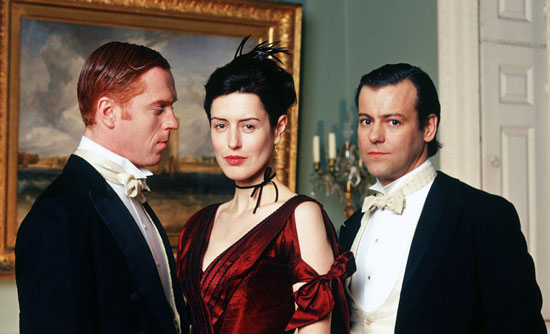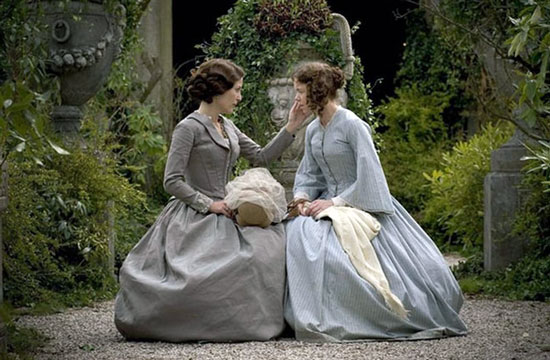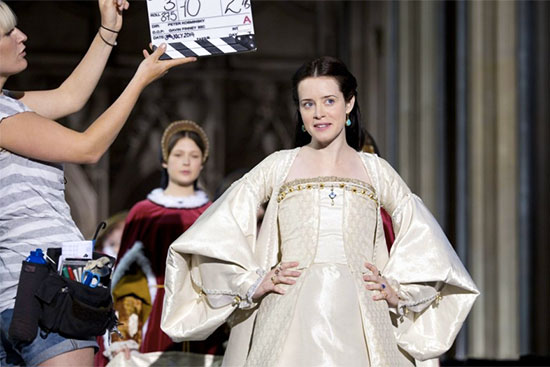Last Updated on June 7, 2023
Actors have always been Masterpiece’s best asset. Critics may find fault with the script or cinematography, but they almost always point out the excellence of the performances. This was true in 1971, when reviewers complained about the contorted plot of “The First Churchills” but praised the acting of Sir John Neville and Susan Hampshire, and it’s true now.

To help keep this site running: Willow and Thatch may receive a commission when you click on any of the links on our site and make a purchase after doing so.
As for the rest of us: we idolize these actors, bestowing our Anglophilia, every last drop of it, on people like Benedict Cumberbatch, David Oyelowo, and that other British monarch, Maggie Smith.
The pleasure American viewers take in watching Masterpiece’s performances goes beyond the skills and personalities of its actors, however. It’s also about experiencing television as a kind of theater—of seeing performers who have worked at the Royal Shakespeare Company or trained at schools like the Royal Academy of Dramatic Arts, and who appear regularly on the London stage.
Masterpiece based its original appeal on the assumption that British theater was the acme of cultural entertainment. That traditional appeal persists. And these days, as British actors continue to beat out their American peers for film and television roles, causing a new flurry of Anglophilia and a nationalistic defense of American talent, it is forcing Hollywood to take a cold, hard look in the mirror.
What have been Masterpiece’s best performances over the years? Trying to choose is fiendishly difficult: a write-down-a-name, cross-out-a-name affair. Below are three performances that top the list for Nancy West, author of Masterpiece: America’s 50-Year-Old Love Affair with British Television Drama.
The following article contains spoilers.
Damian Lewis in The Forsyte Saga (2002)

Thanks to series like “Band of Brothers,” “Homeland,” and “Billions,” Damian Lewis is widely reputed to be the English actor who plays American characters better than Americans. “I go get my groceries now in an American accent,” he claims. But before Lewis mastered his Yonkers dialect or inhabited the psyche of an emotionally damaged marine, he played the tightly wound, tormented Soames Forsyte in Masterpiece’s “The Forsyte Saga.” It was that role that “transformed” Lewis as an actor, he claims. “I’d never played anyone so difficult.”
The character of Soames Forsyte is well-known to many period drama fans: A prosperous partner in his family’s law firm, he is obsessed with two things: reputation and property. Disapproving of his younger brother, Jolyon Forsyte’s, choice to abandon his family for the woman he loves, he arranges matters so Jolyon is left penniless. And when Soames marries the beautiful but poor Irene Heron, he oppresses her with his behavioral demands and jealousies, treating her as if she were some valuable object he paid for and now owns. “Damn Soames, with all his thousands in the bank and no soul,” says Jolyon’s daughter, June.
In playing such an unpalatable character, Lewis discovered what he calls the “argument of acting.” It was Soames Forsyte who taught Lewis how to be a “champion” for his characters, be they overreaching monarchs (Wolf Hall), domestic terrorists (Homeland), or men who appear to lack a soul. Acting is like a legal case for Lewis, as he said in a New Yorker interview called “Damian Lewis’s Transformations.” This idea of a performance as a contest, a dispute that can be won, appeals to his deeply competitive nature. (As one might expect from someone who has baronets and knights in his family, Lewis is legendary for his natural confidence.) “I will always find a defense for characters, and that’s why it’s fun playing people who are morally ambiguous,” he said in the interview.
For Soames, Lewis found one line of defense in his character’s upbringing. Heir apparent to the Forsyte family, Soames has already inherited its dubious Victorian ideals: maintain a sense of order no matter what, bear your burdens stoically, and respect class distinctions. Lewis’s performance is thus a defense and dissection of the British gentleman, a characterization that allows us to see how this ideal shaped men like Soames to their very core, hardening their hearts even as it extolled virtues like gallantry and politeness.
Yet Soames does love Irene—Lewis’s other line of defense. In contrast to Eric Porter’s truly frigid portrayal in the first “Forsyte Saga,” Lewis’s Soames only appears to lack emotion. “You feel too much,” his mother tells him. “You always have,” reminding him that, as a boy, he had a kitten he loved so much he overfed it. Lewis lets us see that little boy beneath Soames’s air of arrogance and taut waistcoats. And while we pity Irene, the actor wins us over to Soames’s side of the argument by making us feel his character’s desire.
The climax of Lewis’s performance is the most infamous scene in “The Forsyte Saga:” it’s late at night, and for once, Irene’s bedroom door is unlocked. She lies asleep. Soames approaches her tentatively, overwhelmed by her beauty. When she awakens and pushes him away, he grows angry and rapes her. The scene occurs in less than three minutes. But within that period, Lewis manages to convey desire, frustration, masculine resolve, self-justification, and regret all at the same time. At the end of it, while Irene lies crying in bed, he speaks to her tenderly, as if the rape had been an act of lovemaking. This isn’t a case of cruel hypocrisy; rather, it’s the deluded act of a man who desperately wishes his marriage to be a success and yet knows he is already defeated. She leaves him the next day.
It’s no secret that “The Forsyte Saga” is grand soap opera. To balance all its melodramatic swirls, cast members had to act with a certain measure of nuance. Not surprisingly, given its roster of stars—Rupert Graves, Amanda Root, Ioan Gruffudd, Gina McKee—almost everyone did, and no one more than Lewis. His performance is a master class in the power of subtlety.
To communicate Soames’s emotional coldness, he speaks in a monotone voice but modulates it whenever Soames is in Irene’s presence. To suggest Soames’s social awkwardness, he averts his eyes when conversing, moves rigidly, gestures uncertainly, trails off his sentences. When Soames make loves to Irene, Lewis has him approach her gingerly, as if she were some exquisite object that his touch might somehow mar. And as Irene grows more distant from him, he begins to interact with the things that stand in for her. Several scenes show Soames waiting outside Irene’s bedroom, touching the knob gently, pressing into the door.
After she leaves him, he lays out one of her ball gowns on a bed, picks it up tenderly, and dances with it. Played by the wrong actor, the scene could have been ludicrous. In Lewis’s hands, it’s indelible.
Add The Forsyte Saga to your WATCHLIST
Gillian Anderson in Bleak House

When American audiences tuned into Masterpiece’s “Bleak House” in January of 2006, they knew actress Gillian Anderson mainly as the redheaded FBI agent, Detective Scully, in “The X-Files,” a cultish sci-fi show about aliens. Anderson had starred as Scully for nine years, and when she left the series, and America, in 2002, she vowed not to do anything in television for a very long time. Then she read the script of “Bleak House” and “fell in love with the character of Lady Dedlock.”
“Bleak House” has become a period-drama favorite: a fast-paced, fifteen-part miniseries about Victorian England’s Courts of Chancery, adapted from Dickens’s novel by Andrew Davies.
It’s also a story about murder, secrets, power, and greed. There are subplots galore, one of which involves Lady Dedlock, an aristocratic wife who harbors a terrible secret: as a young woman, she slept with a man and had his illegitimate child. Entrapped by the mistakes of her past, she suffers every minute because she cannot tell anyone, least of all her husband, the truth. As a consequence, she holds everything tightly within herself, “like a Ming vase with a Munch scream” as a New York Times critic brilliantly put it.
A woman like that is going be blackmailed. And blackmailed she is, by one of the ickiest characters in Victorian literature: a lawyer whose name—Mr. Tulkinghorn— couldn’t be any more Dickensian-Symbolic. What happens? Well, let’s just say things don’t end well for Lady Dedlock (whose name is also Dickensian Symbolic), which is especially tragic because the illegitimate child she thought was dead is actually the novel’s heroine, the resourceful, kind, and plucky Esther Summerson, desperate for a mother.
How do you play a character impenetrable to the world but really cauterized by pain? NPR’s Scott Simon asked Anderson in an interview. “I owe much to the richness of Dickens’s characterization . . . it’s an immediate template for an actor to work with,” Anderson explained.
Following Dickens, Anderson gives a highly stylized, melodramatic performance at first. She delivers her lines with bored hauteur, speaking more slowly than anyone in the nineteenth century. In answer to her husband’s question about whether it is raining, she replies, “Yes . . . my love . . . and I am bored to death with it. Bored to death with this place . . . bored to death with my life . . . bored to death with myself.” Anderson seems to take an hour to get through those lines, but the delivery works because she is so sure of its calculated effect.
Soon enough, Tulkinghorn closes in on her secret, and as he does, Lady Dedlock’s cool demeanor disappears. The scenes between her and Tulkinghorn are among the best in “Bleak House,” putting two captains of composure in contest with each other. But as the series progresses, his composure gives way to cruelty, hers to fear. Terrified and guilt obsessed, she tragically under-estimates the depth of her husband’s love and loyalty, choosing to flee in the middle of the night.
Before she does, she reveals the truth to Esther in a scene so heart-wrenching it would make anyone but Tulkinghorn cry. Andrew Davies admitted to being worried about the scene. “When I came to the moment in “Bleak House” where Lady Dedlock says to her daughter, ‘I am your wretched, unhappy mother,’ I thought ‘Can we really do it like that?’ Then I thought, ‘Let’s just try.’ So basically I copied it out of the book and most people, including me, found it very moving. . . . People have always loved a bit of full-on emotional indulgence.”
He’s right. But Anderson also plays the scene with understatement, making it more emotional rather than less. She weeps but says very little and barely moves. All her suffering is in her face: pale, mysterious, and full of depth.
Her role as Lady Dedlock earned Anderson a bounty of accolades, including nominations for a BAFTA, a Golden Globe, and an Emmy award. Since then, she has become the American actress known for playing British characters impeccably: a Damian Lewis in reverse.
Add Bleak House to your WATCHLIST
Claire Foy in Wolf Hall

When “Wolf Hall” aired in 2015, most of the critical praise was heaped upon Mark Rylance for his masterful performance as the enigmatic Thomas Cromwell. But Claire Foy, twenty-nine at the time and with a fraction of Rylance’s acting experience, was every bit as brilliant, as Anne Boleyn.
Boleyn is a mystery, a confusion of types. Witch, bitch, siren, feminist: she is all these and more, according to the historical record. In the view of some, she was a sorceress; to others, a tramp who bedded her own brother and seduced the king. Those who come to her defense claim she was a pawn, and yet others describe her as a master manipulator.
In Foy’s hands, Boleyn is, like Cromwell himself, determined. Knowing that her body is her currency, she wagers that she can pursue a lawful marriage to the king because of his need for an heir. “I was always desired,” the pregnant Anne says to Cromwell, “but now I’m valued, you see? And that’s different.”
Boleyn is also witty, mysterious, intelligent, and voluptuous: traits we recognize because we see how Cromwell, a shrewd and discerning man, appreciates them himself. She may be responsible for the downfall of his mentor, Cardinal Wolsey, but he nevertheless appreciates her as a worthy opponent. Outsiders both, Cromwell and Boleyn have the sharpest political instincts of anyone in Henry’s court, and one pleasure in watching “Wolf Hall” is to see how each comes to respect the other.
When they first meet in episode one, Cromwell clearly despises Anne for helping to oust Wolsey; and she, used to getting her own way, regards him as an annoying obstacle. By the next episode, a kinship between them emerges. Discussing one lord who refuses to say what the king wishes to hear, Boleyn calls him “a fool.” “Why?” asks Cromwell. She replies, “People should say whatever will keep them alive. You would, wouldn’t you?” Cromwell doesn’t respond, and we know why; she’s right. Like her, he is a survivor.
By episode 5, however, Boleyn has failed to produce a male heir, and Henry’s attention has turned to Jane Seymour. Rather than following Cromwell’s advice to “keep silent and dutiful,” Boleyn becomes more reckless and outspoken. By episode 6, Cromwell is trying her for adultery, forced to do so by the king and the letter of the law. All tight framing and close-ups, the series narrows its drama down to these two figures and their faces. In hers is terror, in his pity and resolve. “Wolf Hall’s” final scene is her execution, witnessed from Cromwell’s perspective. We know what will happen, of course. But Foy’s performance somehow makes history fragile again. Her face is ghastly pale as she walks up to the platform: her final speech, barely audible.
Foy is one of those actresses whose appearance and manner belie her power. Small in stature with porcelain skin and saucer blue eyes, she looks fragile and innocent. These features made her portrayal of the kind-hearted heroine in Masterpiece’s Little Dorrit that much more convincing; here, as Ann Boleyn, it serves as counterpoint to her toughness.
We see that face and can’t believe a woman that ruthless owns it. Foy is also a quiet actress, reserved and self-contained. “She has this amazing capacity to be still and transformative and communicative all at the same time,” her Crown costar Matt Smith said. She uses body movements minimally; everything comes through her voice and face.
In any given scene in “Wolf Hall,” especially toward the end, she rarely has more than several sentences at a time. She doesn’t need words; her fear and desperation are there in her eyes. “It’s hard to look at anyone else in a scene with her because those eyes always pull you back,” said a reviewer for the Guardian. “She is a muted powerhouse.” So, too, is Mark Rylance, one of the most intuitive and self-contained actors in Britain. To see these two actors playing against each other is Masterpiece gold.
Add Wolf Hall to your WATCHLIST
For a list of the period dramas that have aired on Masterpiece, season by season, see this page.
Nancy West is author of Masterpiece: America’s 50-Year-Old Love Affair with British Television Drama (Rowman & Littlefield, 2020), in which she provides a fascinating history of the acclaimed program.
West combines excerpts from original interviews, thoughtful commentary, and lush photography to deliver a deep exploration of the television drama. Vibrant stories and anecdotes about Masterpiece’s most colorful shows are peppered throughout, such as why Benedict Cumberbatch hates “Downton Abbey” and how screenwriter Daisy Goodwin created a teenage portrait of Queen Victoria after fighting with her daughter about homework.
Featuring an array of color photos from Masterpiece’s best-loved dramas, this book offers a penetrating look into the program’s influence on television, publishing, fashion, and its millions of fans.
West is professor of English at the University of Missouri and the author of Kodak and the Lens of Nostalgia (2000) and Tabloid, Inc.: Crimes, News, Narratives (2010). Her books have led to appearances on PBS’s American Experience and the BBC’s Genius of Photography as well as keynote speeches at the National Gallery of Art in Washington, DC, the London School of De- sign, and the Amon Carter Museum. She is a regular contributor to Written by Magazine, the Atlantic, the Chronicle of Higher Education, and the Los Angeles Review of Books. She is currently writing a memoir, set in the 1970s, about movies and childhood trauma.
If you enjoyed this post, wander over to The Period Films List. You’ll also like the PBS Masterpiece 2021 Winter Schedule.

